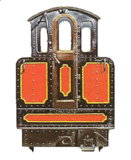Post by CSLR on Feb 10, 2006 16:49:24 GMT
stephenk said:
Modern ATO systems, will hopefully be more reliable, allow for faster journey times, allow for higher line capacity, as well as being safer. The ATO systems will also allow newer high performance trains to be driven to their full potential. The word 'hopefully' in the quoted post got me thinking that there are other factors that come into the equation that are often denied by those promoting change.
Let us consider this by analysing something that has happened on the Underground in the past; see if it had the exact effect that was predicted then; and also imagine what impact it might (rather surprisingly) have on what happens on the system in the future.
Ladies and Gentlemen, let me take you back to the time when gate-stock was replaced by cars with doors that could be closed automatically. Let us compare what actually happened with our list of what hopefully should have happened, and then let us add a few things that were not on the list in the first place.
1. When gate stock was withdrawn, the requirement for gate operators to travel on cars throughout the train was eliminated. Their jobs were lost and they were replaced by a single guard with additional duties and a higher skill level. This apparently resulted in cost savings, which were reduced to a degree by the higher capital cost of the doors, increased expenditure on maintenance and the requirement for a higher skill level for the maintenance staff.
(As an aside. I offer the observation that, until comparatively recently, car examiners invariably used the same two pieces of equipment to deal with a 'sticky' door' - an oil can and a mallet. As this would have been the same equipment that would have been used to deal with a malfunctioning gate, I wonder if someone forget to invest in training several decades earlier?
 )
)2. Did the change to automatic doors make trains more reliable?
Difficult to answer, but there is not much that can go wrong with a gate.
3. Did it allow for faster journey times?
Not really. A good operator could open and close gates as fast (or faster) than an automatic door. There was however a bonus with gates, when traffic was light and no-one wanted to get on or off at a station. The gate operators could simply signal the guard to give 'right away' without opening any gates. This allowed earlier lost time to be made up.
4. Did it allow for higher line capacity?
I question whether this change alone would have allowed additional stock to be run on a line but it would have allowed extra capacity on a train. This is because passengers could be jammed up against a solid door without any danger of it buckling or falling off into the tunnel. There was also increased floor space created on each of the cars that a member of staff was removed from!
5. Was it safer?
See the previous answer and add the fact that lattice gates are notorious for trapping clothing, property and any parts of the anatomy that come into contact with them. It is still possible to get tangled up in a door, but the danger is significantly less. On the other hand. there was a big safety loss by replacing staff who were spread throughout the train with a guard who could not see what was going on in the majority of the cars.
One additional safety note: Gate operators could control the flow into and out of a car and could close individual entry points when overcrowding became serious. They also provided a continuous line of observers along the length of a station platform. After their posts were abolished, there was an absolute requirement for platform staff to be present on stations where the guard did not have a view of the full length of the platform or the train. In this example, you lost staff in one job through automation, but gained a few others elsewhere. This is not always the case. In other instances you may retain the person who originally performed the task (with modified duties) but loose jobs elsewhere as a result of the knock-on (butterfly) effect. This effect can last for an unusually long period of time.
Referring back to the post of stephenk, I suggest that we will continue to feel the impact of the withdrawal of gatestock in future ATO systems.
Comments on this last point have been posted in a new thread Automation: Progress or not? at:-
districtdave.proboards39.com/index.cgi?board=Trains&action=display&thread=1139600626"e=1139600626&page=1









